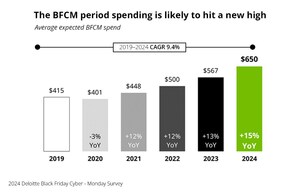Smaller Companies Lag Behind in Anti-Corruption Programs Despite Escalating Enforcement Activity, According to Deloitte Survey
NEW YORK, Sept. 19, 2011 /PRNewswire/ -- Companies with less than $1 billion in annual revenues lag behind companies with higher revenues in their anti-corruption programs, according to a new Deloitte survey.
"Accountability for businesses and their leaders is rising again around preventing and detecting corruption," says Toby J. F. Bishop, director of the Deloitte Forensic Center, Deloitte Financial Advisory Services LLP. "Larger companies have taken the brunt of the enforcement activity so far, partly because they entered emerging markets earlier and, as a result, they have had more time to develop sophisticated anti-corruption compliance programs. However, saying 'we're new to emerging markets' is unlikely to protect smaller companies and their executives from hefty fines and sanctions."
Initiated by the Deloitte Forensic Center, the survey shows smaller companies are almost four times more likely (23 percent) than larger companies (6 percent) to have no written policy addressing anti-corruption. Smaller companies are also almost three times as likely (37 percent) as larger companies (13 percent) to fail to conduct internal audits of each of their foreign operations to identify potential corrupt activity.
"Regardless of size, it's time for all companies to get their anti-corruption houses in order," says Bill Pollard, a leader in Deloitte's Foreign Corrupt Practices Act (FCPA) consulting practice. "As FCPA enforcement continues to rise in frequency and—often—fine amounts, enforcement of the UK Bribery Act is underway and SEC whistleblower provisions for Dodd-Frank are in effect, every company should be taking a very hard look at their anti-corruption policies and implementing updates as necessary."
Additionally, the survey shows smaller companies are more than twice as likely (32 percent) to fail to provide updates on anti-corruption and FCPA compliance programs to board members as larger companies (14 percent). And smaller companies are also half as likely (15 percent) as larger companies (33 percent) to use software to identify suspicious or anomalous payments that could indicate corrupt activity.
"With government budgets in crisis in many countries, public scrutiny of government contracts and challenges to contract awards by competitors may increase substantially," adds Pollard. "Companies would be wise to enhance their transaction monitoring, data mining and other anti-corruption processes where appropriate to help mitigate the potentially increased risks of government investigations."
Among smaller companies, 37 percent report they are not likely to reevaluate anti-corruption programs in light of the Dodd-Frank whistle-blower provisions; 20 percent of larger companies report the same. Leading practices in updating anti-corruption programs include:
- Conducting robust anti-corruption risk assessments and analyses of control gaps;
- Developing detailed stand-alone policies and specialized internal anti-corruption audits;
- Performing specific anti-corruption due diligence prior to acquisitions;
- Improving due diligence and monitoring of third-party relationships; and
- Enhancing anti-corruption programs in emerging markets.
For more information on the research, visit www.deloitte.com/us/pr/anticorruptionsurvey2011.
About the survey
The Deloitte Forensic Center engaged Bayer Consulting to poll 276 professionals online regarding their companies' efforts to prevent corrupt practices in their operations around the world and ensure compliance with the Foreign Corrupt Practices Act (FCPA) and similar legislative requirements. The survey was conducted during the first quarter of 2011.
A total of 35 percent of the respondents who replied to the survey question about company revenues were from companies with less than $1 billion in annual revenues; 65 percent of respondents represented companies with more than $1 billion in annual revenues.
Respondents represented a variety of industries including manufacturing (29 percent), financial services (14 percent), technology/telecommunications/media (12 percent), and energy/resources (8 percent).
As used in this document, "Deloitte" means Deloitte Financial Advisory Services LLP, a subsidiary of Deloitte LLP. Please see www.deloitte.com/us/about for a detailed description of the legal structure of Deloitte LLP and its subsidiaries. Certain services may not be available to attest clients under the rules and regulations of public accounting.
Contact:
Shelley Pfaendler |
Liz Cheek |
|
Public Relations Deloitte |
Hill & Knowlton +1 212 885 0682 |
|
+1 212 492 4484 |
||
SOURCE Deloitte
WANT YOUR COMPANY'S NEWS FEATURED ON PRNEWSWIRE.COM?
Newsrooms &
Influencers
Digital Media
Outlets
Journalists
Opted In






Share this article